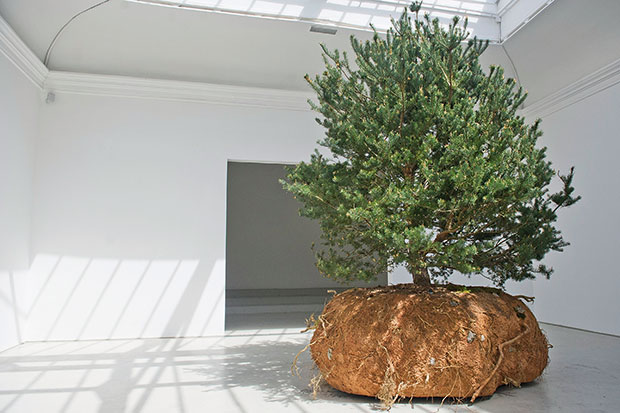‘Fucking hell. You twat. Fuck off. Fuck. Fuck.’ These dispiriting words are the opening line of Tree, a newish play by the lugubrious comic Daniel Kitson, whose stand-up show once transported me into the heavenly arms of Lethe. His script opens with a chance encounter between two oddball smart Alecs. The outdoor setting, borrowed from Beckett, is a suburban cul-de-sac where a single tree is about to shed its autumn raiment. One man crouches in the branches, another stands below. They exchange confidences, observations, food and witticisms. At the end, one departs.
This is a play of quips and anecdotes but no significant action. The tree-dweller is an eco-warrior protesting at the council’s policy of bough amputation and trunk eradication. The man below is a married solicitor hoping to share a date with a prospective girlfriend. Neither story makes sense. The protestor claims to be a local landlord who has inhabited his tree for nine years with the help of two friendly clients who deliver mail and meals to him as a condition of their tenancy. The man below appears to have chosen the unlikeliest spot on earth, a suburban pavement, for a date with his heart’s desire.
This deliberate absurdity is the glory of the play. Kitson, an immensely resourceful wordsmith, sets out to goad and tease the audience by daring us to believe the preposterous twaddle each man is telling the other. Both characters are witty, anti-authoritarian eccentrics with a love of literary swordplay. The dialogue is wonderful. It has the dense and exuberant springiness of Seinfeld but with a refreshing and authentic English flavour. Plus a lot of swearing. It’s hard to convey its virtues in tiny excerpts but I’ll try. Man below contends that surrendering one’s bus seat to a woman isn’t virtuous but narcissistic: ‘You’re just making 30 other cunts think you’re a fucking champion.’ I know. It doesn’t work in brief snatches. You’ll have to see the play (and if you miss the present run you can be sure it’ll pop up elsewhere).
Let me add two health warnings. The script lays out all kinds of plot threads with enormous inventiveness and charm. The intrigued play-goer watches these narrative filaments spinning forth and expects to be stunned and delighted at the finale when two loose ends are miraculously conjoined in an explosion of storytelling joy. This doesn’t happen, I’m afraid. Kitson delivers a cop-out ending that lacks even the courage of its own indecision. The dénouement is left dangling in a futile limbo. The youngsters in the stalls didn’t seem to mind too much and they responded throughout the show with Jack-in-the-box surges of euphoric laughter. But the older viewers, I noticed, watched with unsmiling lips and Easter Island disdain.
Donkey Heart, by Moses Raine, is about skint Muscovites learning to cope with the new killer capitalism whose code has replaced the old murdering Marxism. Characters galore crowd into a tiny one-loo flat. There’s silly Tom, angry Sasha, shifty Natalia, frosty Ivan, drippy Zhenya, kindly Alexander, nutty Petya, pouty Clara and quirky Kolya.
The storylines pile up. Petya wants to dodge the draft by getting himself certified insane. Tom, an English thickhead, is loitering in the boxroom vaguely hoping to pork Sasha, the family sex bomb, who still pines for her Parisian spooning partner. Wise old Alexander mourns his long-lost son who was arrested by the KGB, aged 12, and later executed. Schoolboy Kolya likes to scandalise the elders by downing shots of vodka and daubing his face with a Hitler moustache. ‘I’ve got nits,’ he declares to a guest. ‘I wonder what it’s like to have sex.’
The play’s warmth and richness are skilfully realised in this production by Nina Raine (Moses’s sis), but the wonky structure delivers a few creaks and parps. There are too many organisms squirming in the maggot pot. The parents, Zhenya and Ivan, have no room to flex their personalities and Tom is barely a hairdo with a heartbeat. And the focus goes all blurry in places. Act One follows the Tom–Sasha collision. Act Two parks that pile-up in the corridor, and turns into A Hunt for Ivan’s Mistress. The quarry is uncovered, in a cunning subplot, when an incriminating conversation is secretly recorded. Admirable though the narrative is, it creates the impression that Raine is declaring an opinion through the text rather than letting it emerge from the spontaneous actions of his characters. Result: an ingenious psychological proof rather than a slice of family life. What he wants to tell us is that the Soviet culture of eavesdropping and denunciation is not a specialism of commie dictatorships but a universal failing. A fair point, artfully made, but with a tad too much contrivance for comfort.







Comments